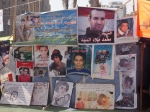The last thing we expected on our trip to the pyramids was to be freezing cold and practically alone. Winter is usually peak season for Egyptian tourism, but since the revolution all the most popular tourist sites are pretty much dead zones. Which was great for us, but not so great for the Egyptians.
While I can appreciate the sheer majesty of the pyramids, their age, their size and their history – something about the experience was a little underwhelming. I think the fact that where once the glorious and majestic Nile once ran in front of the pyramids has now been replaced with a sprawling urban mass. In fact one of the best views of the pyramids can now be seen from the Pizza Hut building, which is just depressing. Couple this with the fact that the recent (actually not so recent if you account for Mubarak’s entire reign oh and the entire period of colonialism) troubles this country has experienced has only amplified the desperation of its people. Everywhere you go, and I mean everywhere, in any major tourist site you will be hassled. It’s relentless and arbitrary and beyond annoying. All the guidebooks tell you to beware of the hassling but the level has increased so much that it’s almost hostile.
It’s a tragedy what has happened to this country. We saw practically no police the entire duration of our trip – in fact the whole country had a wild west feeling to it. In major tourist attractions like the Egyptian Museum in Cairo the toilets were dirty and largely unclean without toilet paper. Unpaid staff were buying tissues with their own money and trying to earn some money by selling these to toilet goers for tips. And the museum wasn’t cheap. The place just reeked of corruption and greed. And a country once gloried for its advanced sanitation and hygiene programs is now almost one giant toilet bowl. Dirty, uncared for and desolate.
I heard that a lot of Egypt’s treasures now live in the museums and squares of other countries around the world, and originally this angered me. How neo-colonialist and paternalistic I thought. But when I visited Egypt and saw the way in which some of their sites were (not) cared for I had to be thankful that at least some of the historic relics will survive.
Egypt has such potential but it is a ravaged country. Ravaged by greed and corruption and blinkered religious fervour. And they largely have the West to thank for it – first through colonialism and then through their support of one of the most slimey despots of our time – Mubarak.








